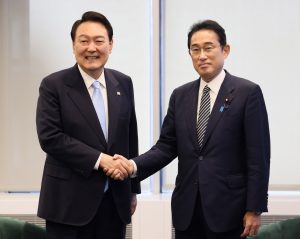On March 16, Japanese Prime Minister Kishida Fumio and South Korean President Yoon Suk-yeol held a bilateral summit meeting in Tokyo. The visit by Yoon on March 16-17 – the first by a South Korean president since December 2011 outside of multilateral settings – signaled that both sides are invested in normalizing relations, deepening trust, and establishing a strategic cooperative relationship. The two leaders agreed to resume reciprocal visits to each other’s country as well.
Why have the Japanese and South Korean leaders decided to move to improve ties now? North Korea is an immediate factor, for one. North Korea’s role in all of this was vividly illustrated by the 30-minute delay in Yoon’s departure; the South Korean president had to attend an emergency meeting of the National Security Council in response to an apparent ICBM missile launch by North Korea.
There is a strong defense component to the thaw in relations, as the two leaders agreed to resume security dialogue between foreign and defense officials of both governments for the first time in five years. In addition, in a move welcomed by the United States government, the General Security of Military Information Agreement between Tokyo and Seoul will also be normalized to share information regarding North Korean missile launches and flight tracking.
Another factor is China. The importance of the Japan-South Korea bilateral relationship in countering China can be seen in the measures discussed, such as setting up a new framework to discuss economic security. Japan and South Korea are also likely to cooperate in advanced technologies such as quantum technology and reducing reliance on China for the supply of semiconductors and mineral resources.
The challenges presented by North Korea and China highlight the importance of Japan-South Korea cooperation and shaped concessions on both side that paved the way for improved ties. On South Korea’s side, Seoul announced on March 6 that the government would establish a foundation to provide compensation to the wartime laborers who sued Japanese companies. On Japan’s side, Tokyo prepared to relax strict export control measures against South Korea.
The personal role of Yoon should not be overlooked either. In an editorial, Yomiuri Shimbun wrote, “It was Yoon’s political decision that led to a breakthrough in bilateral relations that had been described as ‘the worst in the postwar era’ due to issues such as lawsuits related to former requisitioned workers from the Korean peninsula.” In news coverage of the summit, Yujiro Okabe and Takayuki Nakagawa of Yomiuri Shimbun observe, “Yoon has a unique background. He served as a prosecutor and has no political experience. His decisiveness set the environment for the summit meeting.”
What does this mean for the future? Indicators to keep an eye on include: Will Kishida reciprocate with a visit to Seoul this summer? Will Yoon attend the G-7 summit in Hiroshima this May? How will South Korea fit into the Quad? How will South Korea fit into Japan’s updated vision of a “Free and Open Indo-Pacific”? Will Canada’s proposal for a four-way cooperative framework between Canada, the United States, Japan and South Korea stick?
Another indicator is public opinion – both as a an actual constraint on Japanese and South Korean concessions to each other, and as a reality check. According to an Asahi Shimbun survey after the visit, 63 percent of respondents evaluated the summit highly, however, 57 percent answered that they expect “things will remain the same as now.” Only 35 percent held positive views of the future of bilateral relations, and 3 percent held negative views.
Though the recent summit is a step in the right direction, there is still a long road ahead before Japan-South Korea military and economic security cooperation can be described as robust, reliable, and resilient.
































